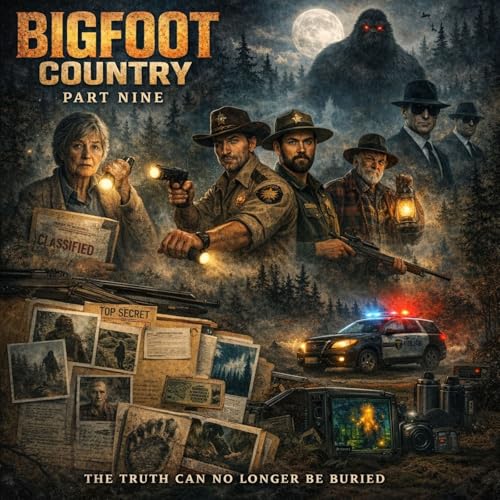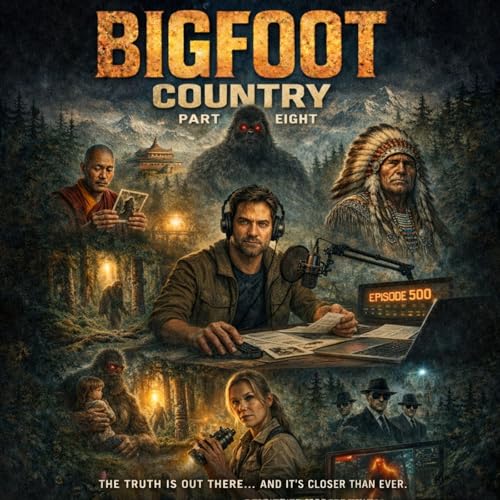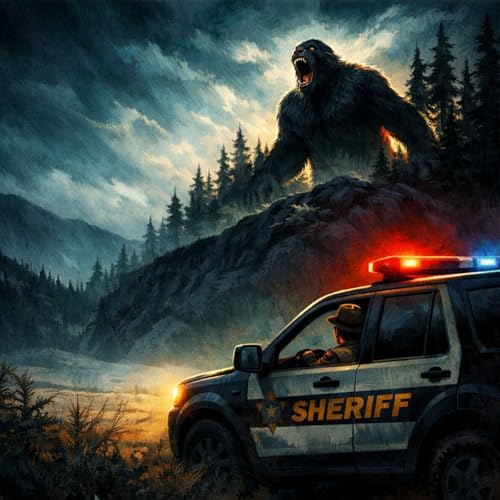Part Nine brings Bigfoot Country to its climax, and it does so by circling back to where every great investigation begins — with the people who lived it.After years of building this platform, the floodgates finally opened. Witnesses who had been listening from the shadows for months, sometimes years, started stepping forward. People like Patricia Ann Holloway, a seventy-one-year-old retired librarian from Pennsylvania who had carried a secret since 1973 — the summer she was nineteen years old and working at a Baptist church camp in the Allegheny National Forest.
What she saw standing at the tree line that night, seven feet tall with eyes reflecting her flashlight beam, changed her forever. She kept quiet for nearly fifty years. When the only other witness — a twelve-year-old camper named Susan — passed away from cancer, Patricia decided she wasn't going to take that secret to her grave too.Her story opened the door for dozens more. A ninety-year-old former logger from Vermont who remembered the creatures the old timers simply called the Wild Men. A woman from Mississippi passing down her grandmother's encounter from the nineteen twenties. A retired park ranger from California who had spent forty years documenting things he could never put in an official report.
But the witnesses were only half the story. Researchers started coming forward too — scientists and academics who had sacrificed careers and reputations to study something the mainstream refused to acknowledge. A primatologist who recognized authentic dermal ridges on a footprint cast. A geneticist with hair samples that matched no known species. An anthropologist who had collected indigenous oral histories from around the world and found an undeniable pattern running through all of them.Then came the most dangerous interview of all.
A former military intelligence officer, speaking through an encrypted line, revealed the existence of government programs spanning six decades. Programs designed not just to suppress evidence, but to study these creatures — and exploit them. He couldn't say everything. He said enough.The tension ratcheted up from there. Physical confrontations on mountain roads.
Men in dark suits offering deals and making threats. And a manila folder full of classified documents that blew the lid off everything — project names like Titan Watch, Forest Shadow, and Mind Bridge, detailing decades of monitoring, containment, and experimentation on captured creatures.Through all of it, Brian wrestled with the personal weight of the mission. Late night conversations with his mother, who carried her own encounters with the unexplainable. Quiet moments on the porch with Daniel.
A faith that had evolved far beyond the Baptist church of his childhood into something broader and harder to name — a belief that the universe held mysteries worth chasing, no matter the cost.
The final expedition into the Pisgah wilderness brought everything full circle. Days of waiting. Thermal signatures circling in the dark. Vocalizations echoing through old-growth timber. And on the last night, alone at the edge of camp under a full moon, a moment of silent recognition between two species that have shared this land far longer than anyone wants to admit.
Part Nine is about what happens when the dam finally cracks. When the witnesses refuse to stay silent. When the researchers stop protecting their careers and start protecting the truth. And when one man, standing on a dark porch in the Appalachian Mountains, hears a chorus of howls rising from the forest and knows the world is about to change.
Voir plus
Voir moins
 Feb 25 20261 h et 12 min
Feb 25 20261 h et 12 min 58 min
58 min Feb 20 202642 min
Feb 20 202642 min Feb 18 20261 h et 13 min
Feb 18 20261 h et 13 min Feb 15 202656 min
Feb 15 202656 min Feb 13 20261 h et 16 min
Feb 13 20261 h et 16 min Feb 11 20261 h et 2 min
Feb 11 20261 h et 2 min Feb 8 20261 h et 13 min
Feb 8 20261 h et 13 min
